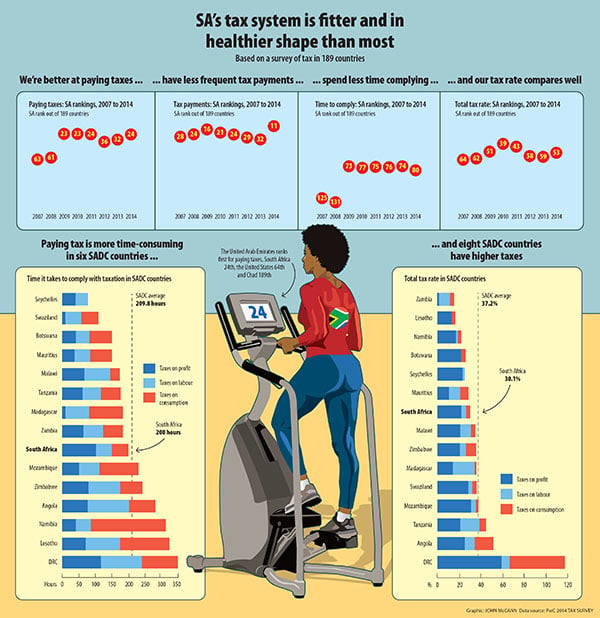
South Africa's tax-paying ranking has improved over the past two years as a result of the success of the e-filing system and the abolishment of secondary tax on companies.
Charles de Wet, a tax partner at PwC, said the improvement is owed largely to a reduction in the number of payments made by small and medium companies and the scrapping of secondary tax in favour of a dividends tax, levied on shareholders. These have helped to reduce the total tax rate.
A report by PwC, Paying Taxes 2014, looked into the tax regimes of 189 countries and found that, on average, small to medium businesses in South Africa make only seven tax payments during a financial year.
This is compared with the more cumbersome statistic of 36 tax payments a year recorded by the rest of the continent — and is a positive sign for a country looking to grow its small business sector.
De Wet said it is not likely that the number of payments will drop further; in fact, there will probably be more payments as the South African Revenue Service (Sars) has introduced new measures that are likely to increase the compliance burden on taxpayers.
"It's unlikely that we will see the number of tax payments improving further; if anything, we expect them to go up in the future," he said.
Experts are concerned
According to the report, South Africa saw a significant reduction in the total tax rate in 2012 — a broad measure of all business taxes — from 33.3% to 30.1%, which saw it placed 53rd out of more than 180 countries.
But tax experts who conducted the research, such as De Wet and PwC tax technical partner Kyle Mandy, are concerned about whether South Africa will be able to maintain these gains.
Mandy said that South Africa's improved ranking on tax payments, climbing from 32nd place to 11th in the study, is "largely due to the success of e-filing and the way in which returns are filed, as well as the reduction in the total tax rate. The ranking change is not the result of tax reform," he said.
Paul de Chalain of PwC South Africa said in the report that the trend, which had seen the time taken to comply with tax obligations decreasing steadily thanks to e-filing, could be eroded in the future because of a number of new measures introduced by Sars.
These include the introduction of a new corporate income tax return in 2013 with enhanced disclosure requirements; a supplementary income tax return whereby companies may be required to reconcile accounting profits, payroll taxes and indirect taxes; and "onerous" compliance requirements, along with a new dividends tax.
He also pointed to the withholding of tax on interest paid to nonresidents that is to be reduced in 2015, the reform of transfer pricing, as well as the renegotiation of tax treaties and the negotiation of bilateral and multilateral mutual assistance and exchange information agreements.
Pressure on tax revenues
"In addition, many corporates report a marked increase in Sars inquiry and audit activity," he said.
However, De Chalain said South Africa is not the only country to implement such measures in a bid to protect its tax base. It is an indication of the "pressure that tax revenues are under", he said.
De Wet said South Africa's overall tax rate of 30.1% compares favourably with the world average of 43% and Africa's 52.9%.
The fact that it takes 200 hours for a company to complete and file its tax return, against a global average of 268 hours, is impressive, he said.
The only other African countries that use electronic filing are Mauritius, Tunisia, Kenya, Rwanda, Madagascar and Uganda.
De Wet said corporate taxes are higher than the global average and that the government should consider increasing VAT, which, at 14%, is way below global rates, to reduce the taxes on companies.
"A 1% increase would mean an additional R15?billion," he said.